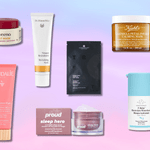This Canadian Beauty Brand Uses Traditional West-African Ingredients to Soothe Skin

Nigerian skin care traditions transformed Yoyin Familusi’s skin—and inspired her business.
Walk down the skin care aisle of any drugstore and you’ll see rows of product and ingredients. But in Yoyin Familusi’s home, skin care means one thing: shea butter.
The fluffy body butter is made from shea nuts from trees indigenous to Sub-Saharan Africa and has long been used as a vital skin and health care ingredient. In Nigeria, where Familusi is from, shea is just one of the many locally sourced natural ingredients found in skin care secrets passed down through generations—salves Familusi now shares through her Calgary-based brand, Sewa Skincare.
“My earliest memories are of my itchy skin or rashes on my arms,” recalls Familusi, who was born and raised in Lagos, Nigeria. She remembers suffering from childhood skin irritation throughout her childhood. Dermatologists suggested steroids, but using an anti-inflammatory drug wasn’t a long-term solution.
Plus, Familusi’s mother worried about side effects. “A lot of the [prescription] ingredients were strange to her, and she didn’t have the internet to do her own research,” explains Familusi.
Turning to Traditional Remedies
In search of gentler alternatives, her mother consulted an elèwè omo (the Yoruba word for herbalist). With the help of family and friends, she also learned how to make traditional remedies with ingredients from local markets.
Familusi’s mother started with homemade black soap—a common bath product with many variations used throughout Africa. Familusi’s mother made hers out of honey, camwood and glycerin. She also infused bathwater with red acalypha leaves, which has antibacterial and antifungal properties that can help with eczema—and could be plucked straight from their garden. With time, her mother’s mixtures healed Familusi’s skin.
The Power of Clean Beauty
Years later, when Familusi had her own daughters, she followed this example. “I associate my mother and the idea of mothering with skin care,” she says. She started making her own combinations of coconut oil, shea butter and generational knowledge. First it was for her family, and later for others who were inquiring about her daughters’ glowing skin. It was the launch of an informal side business selling shea butter, liquid black soap and hibiscus body oil.
Afterwards, Familusi leaned on knowledge from her family and friends in Lagos. She also ventured into nearby villages, where natural ointments are more commonly used. Likewise, she spoke with women skilled in natural remedies. It was important for her to understand how ingredients like efun ilè (a white powder that loosely translates as “earth chalk”) can sooth itchy rashes or welts. Afterwords, Familusi then combined that knowledge with a course on organic formulation from U.K. school Formula Botanica, learning how to transform traditions into products.
Launching Sewa Skincare
When her family moved to Calgary in 2018, Familusi had one goal: to run her own business. She launched Sewa Skincare in October 2020. Her products still used natural West African ingredients, but she reformulated them for the dryness of North America. Sewa (pronounced share-wa) means to “make beauty” in Yoruba, explains Familusi—and, for her, the phrase means “enhancing the beauty you already have in you.” Her customers use her products for many things, including calming a child’s eczema and healing after a mastectomy.
The Sewa line now includes a hibiscus body mist, rele shimmer oil and a line of beard care. With each product, Familusi hopes her customers gain healthier hair and skin, and a greater respect for traditional African remedies. “I am passionate about helping people understand and see the continent of Africa through the eyes of value. I appreciate the knowledge that has been preserved for generations.”




